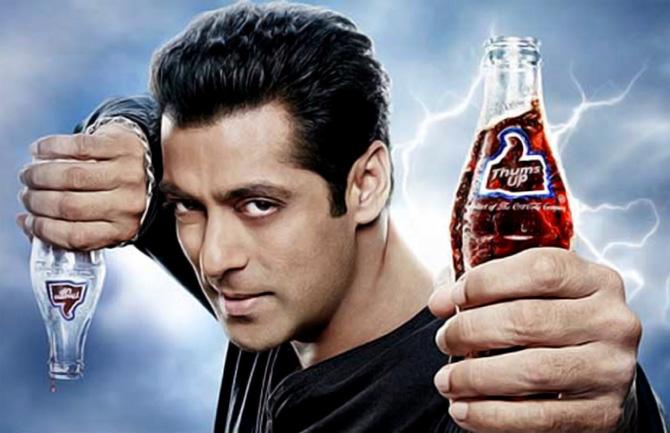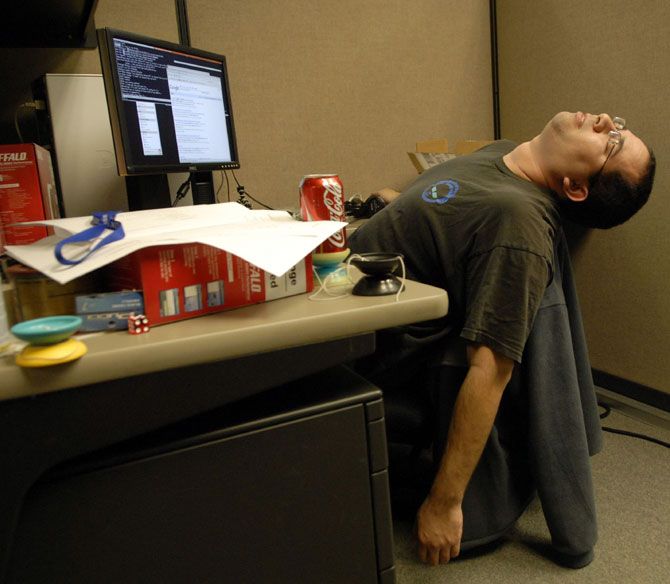Yoga acharya Shameem Akthar takes at a look at what you can do to avoid the pitfall of obesity.

As we crack our heads debating which will be the most defining generation in recent human history, one thing is clear. The most unhealthy, it seems, is the group that is famously called Millennials.
Ahead of them, Baby Boomers and Generation X have flirted with fire (smoking was the social cool) and seen scourges like AIDS, but millennials are now being seen as collectively the most unfit of the lot.
The numbers are disturbing.
Seven out of 10 millennials will be obese by the time they reach middle age, according to Cancer Research UK. And this means attendant diseases that favour the obese -- chronic kidney disease, diabetes, heart issues and many types of cancers.
There are several reasons for this state of affairs -- some well-known, others only guessed at.

Food market strategies
Millennials like quick fixes.
Though they are apparently health conscious, they want food on the table quickly and with minimal fuss.
The market has met this need for convenience and speed by creating tasty heat-and-eat packages that loudly proclaim to be healthy and fat-free.
It's an open secret that fat-free only means there is less fat than what is the norm.
You should also remember the additives that are added to extend shelf-life, the hidden calories in packages that claim to be 'diet' food; dressings that claim to be based on your trusted grandmom's recipe; dips that boggle with so many ingredients that you end up believing all of it must be actually healthy; alternatives to sugar that are calorie-dense...
Industrial farming has, in the last few decades, 'mutated' farm animals to such an extent that they are passing on obesity through the food chain.
Vegetables and fruits are harvested in a manner Nature did not intend.
All of this means there's tonnes of food looking robust and drool-worthy but contributing directly to the ballooning incidence of obesity.
What to do
There has been an attempt at regulation through the slow-food and back-to-organic route.
Currently, some of these options are more expensive than the fat-inducing ones. However, your local farmers's markets can be a good and less expensive source.
For those who want quick fixes, there are gadgets that can help -- sherbet makers, ice cream makers, juicers, blenders and choppers that make salads easier than it was for our moms.
Online tutorials give you easy-to-follow and quickie recipes.
Initially, all this may be a bother but home-prepared (as against packaged) food is actually a simple and quick route to healthy choices that will help control clinical obesity.

Sweet beverages
They started out as aspirational -- bottled drinks advertised by super-cool superstars. The rise in consumption was inevitable.
The group most hit by sweet beverages -- many masquerading as health substitutes or low-calorie drinks, or even as fruit juices -- is the millennials.
These drinks are addictive, full of calories and of no nutritional value, with the added load of questionable phosphates which are said to damage kidneys and create depression or lethargy (or both).
The clarion call to hydrate to stay healthy has been wrongly met by these drinks. The companies making them have big budgets and are known to manipulate research and influence the marketing policies of governments.
But the cat is finally out of the bag now -- these drinks are prime suspects in the obesity pandemic that has hit millennials hard.
Sugary stuff -- not just in drinks -- create a blood sugar spike and then a steep drop, leading to a craving to meet this shortfall. It also taps into our evolutionary craving for sugar as an easy source of energy.
In times of scarcity, sugar was the best food for a quick hunt in the jungle. That is how it started on the evolutionary cycle.
But this need has become redundant since we now lead largely sedentary lives.
What to do
Weaning oneself from sugary food, especially drinks, can be as (or even more) difficult than trying to drop the smoking or alcohol habit.
Here are some tips that will help.
Avoid storing these drinks in your fridge. Use fruit infusions to curtail the craving instead.
There are very attractive bottles available that allow fruit pieces to float separately and infuse gently into your water. It looks pretty and you will feel special sipping on this.
Do not substitute sugary drinks with fruit drinks or shakes. These are calorie-dense and not a healthy way to have fruits.
In case you need juices, or flavoured drinks, opt for vegetable juices. Again, don't look at the shop shelf; make it at home.
Once you make this effort, you will find it easy to avoid sugar-spiked drinks.
Interestingly, it has been found that hardcore workouts heighten the sense of sweet in the mouth. Perhaps, the release of endorphins from physical activity also acts as a good substitute for sugar.
So, if you are addicted to sugary drinks, start fighting it with a regular workout.

Sedentary lifestyle
Most millenials have sedentary jobs. Even farmers belonging to this generation are not running around like their fathers and grandfathers did. Everything is high-tech and managed from the desk.
This has been a major contributor towards millennial obesity.
Another interesting fact is that many millennials are living with their parents, instead of having a household of their own. As a result, they are used to being taken care of.
With a sedentary lifestyle at home and work, it is a double-whammy.
The entertainment this generation seeks is also sedentary -- social media fraternising, parties with other millennials who have an equal disregard for health, watching television or playing electronic games.
The baby boomers were into yoga and beachy stuff.
The post-millennials are trying to break the trap into which the millennials have fallen.
But the millennials are happy and reluctant to stir out.
Every year, new research highlights the different types of health issues peculiar to millennials -- cancers and chronic kidney issues.
The American Cancer Society is said to have identified 12 types of cancers that are related to obesity. Of these, millennials are particularly affected by colorectal, uterine and gallbladder cancers.
What to do
The solution is simple.
MOVE!
A sedentary lifestyle is said to be as or more dangerous than chronic smoking. It causes bone loss, muscle loss, fat accumulation, flaccidity of blood vessels, heart weakness and respiratory weakness, just to name a few problems.
Moving fights all of this.
Join the local gym.
Go for a dance class.
Install apps or use gadgets that keep track of your walking, give you heart points, prod you to move.
Do not be a weekend warrior (where you most likely to injure yourself). Schedule workouts at least five days a week.
Give yourself walk or stretch breaks if you are desk-bound throughout the day.
These not only help you physically, but also boost mental focus and alertness.

Gadget fixation
The problem with the millennial group was that their parents kept them quiet with gadgets.
Most were born into small families, nuclear households with parents scrambling between jobs and long commutes.
With not many siblings to play with, or grandparents to baby-sit, this group had gadgets to substitute for friends and family.
This is now part of their psyche and they are used to entertainment from a gadget -- games, shows, online friends...
Their entire life revolves around gadgets and they become phobic when gadgets are not around.
This fixation has already created attendant problems -- of being indoorsy and not being exposed to the right amount of sunlight. This resultant Vitamin D deficiency causes loss of bone density and respiratory problems.
Overusing gadgets also causes causing chronic insomnia due to the effect of the light from the gadgets affecting the pineal gland and its cycle of melatonin release.
What to do
Use the gadget to fight its addiction.
Install apps or enrol in online fitness programmes to start a health regimen. This way, the gadget is working for you instead of against you.
De-programme yourself from a gadget addict’s life by rewarding yourself for a certain number of hours you keep off them. This will create less dependence eventually.
Start on to hobbies that are not gadget-induced -- like art, gardening, swimming, dance, etc.
Even sedentary hobbies like reading a hardcover book (instead of reading on your gadget) can make a difference, creating a different mindset and a different approach towards the idea of entertainment.

Long commutes
Millennials also commute long distances and travel a lot for work, both within the city and outside it.
This is akin to being tied to a chair and moving passively from one spot to another.
It is also mentally exhausting, explaining why this group feels it has no energy left for sporty activities.
A global phenomenon, long commutes are also due to the sky-rocketing cost of real estate in work-dense parts of cities.
Long hours of travel cause other attendant problems -- cardiovascular issues, diabetes, fluid retention, spinal problems and, of course, digestive issues from eating the wrong kinds of food as a quick fix for those hunger pangs.
What to do
We cannot wish away the commute or the travel.
But if you are being driven about, you could engage in gentle stretches in your seat.
There are several chair yoga and seated exercise options available online. You can download charts and keep a sequence for practice.
Plan your workout ahead, instead of at the end, of the day.
This way, you can fulfil your quota of movement for the day.
Do not have impossibly long fitness plans, at least initially.
It is better to do something daily, even if it is for 15 minutes, than do heavy duty workouts for few days weekly.
With this one simple investment, you will find a drastic improvement in your overall health and mental focus.
Shameem Akthar, health columnist, author of yoga books and yoga instructor, is a keen fitness enthusiast.
Rediff.com and Shameem recommend that the suggestions made in this column must always be followed in consultation with your medical practitioner.
*Images posted only for representational purposes.
What are your stay fit tips? Please do post in the message board below!











 © 2025
© 2025